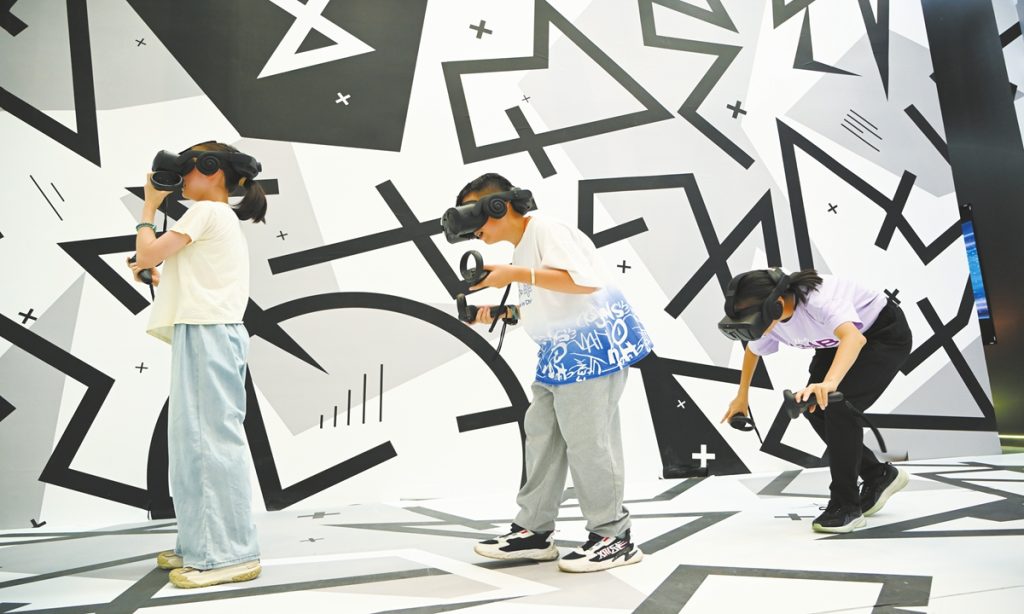Faster digital transformation ramps up productivity of manufacturing, services in China

If you asked people about artificial intelligence (AI) 10 years ago, most wouldn't have understood its meaning. Today, however, AI has been gradually integrated into all aspects of daily life in China, such as travel, retail, medical care, entertainment, logistics and many other fields.
Analysts noted that the acceleration of digitalization and expanded AI applications in the services sector has become a new trend, driven largely by advancements in AI innovations.
In the near future, a more extensive and faster digital transformation of the services sector is essential to ensure broader benefits for the public. Progressively, thousands of industrial lines will be empowered by AI, which could reduce the cost of manufactured products and service charges.
Recently, several AI-powered service examples were showcased at the just-concluded 2024 China International Fair for Trade in Services (CIFTIS) in Beijing.
Deep AI integration
For example, AI has already assisted many people to land a job in China. At the 2024 CIFTIS, Alipay unveiled an AI-powered public employment robot named Xiaogu, designed to support the smart transformation of employment-related services.
According to data, assisted by AI, the matching rate of people and job vacancies has been increased by at least 10 times, Alipay said.
While AI-powered services like this may go unnoticed by many, the application of AI innovations in sectors like tourism and online gaming is more visible.
The integration of AI with specific scenic spots in China is providing significantly improved travel experience.
For instance, in the scenic area of Mount Huangshan in East China's Anhui Province, an AI escort service has been introduced -- showcased at the 2024 CIFTIS. The AI-powered application can recommend services throughout the entire journey, assisting tour guides, taxi bookings and food options, based on tourists' spatial positioning, the Global Times has learned.
"AI can facilitate very creative content production, and the digital content can be combined with the natural scenes in the scenic spots, using augmented reality (AR) technology carriers, like AR glasses," Chen Xi, a vice president of Rokid, a Hangzhou-based AR tech startup, told the Global Times on Friday.
AR is a technology that enhances or provides additional information about what people can see in physical reality through digital images, sounds and text. AI enhances AR by enabling it to recognize and augment the real world more effectively.
"In addition to immersive travel experience realized by tapping the AR technology, we could also create some treasure-hunting games with the help of AI in the context of local culture to better fit in to the needs of the sightseers," Chen said.
AI technologies have been applied in museums too. Foreign tourists visit exhibitions using AR tools in Chinese museums, enhancing the quality of their experience, as AI could help remove barriers such as language, Tian Feng, dean of SenseTime's Intelligence Industry Research Institute, told the Global Times on Friday.
OUTPUT, a Shanghai-based leading digital content technology company aiming for the creation of an ecosystem for digital culture, has recently created digital content and new scenario-based experience works in collaboration with Beijing's Palace Museum and Shanghai's Yuyuan Garden.
"We have helped showcase the treasures of the Palace Museum digitally in Singapore and participated in the Yuyuan Garden Lantern Festival in Paris and Shanghai to celebrate the 60th anniversary of the establishment of diplomatic relations between China and France," said Liu Yinmeng, founder and CEO of OUTPUT.
'AI Plus' initiative
"The development of AI technologies will bring great changes and opportunities to many sectors, such as tourism, sport and gaming," Tian said.
"AI Plus" was mentioned in the State Council's Government Work Report for the first time in 2024, saying that China will launch an AI Plus initiative, and build digital industry clusters with international competitiveness, and will also promote the digitalization of the service sector.
"AI Plus" will serve as a key driving force of the economy, integrating with a wide range of sectors such as healthcare, education, while helping promote the transformation and upgrading of many traditional industries, Wang Peng, an associate research fellow at the Beijing Academy of Social Sciences, told the Global Times on Sunday.
In 2023, China unveiled a plan to ramp up the country's comprehensive digitalization process, including support for in-depth integration of digital technology and the real economy, and the application of AI technology in agriculture, manufacturing, finance, education, medical services, transport and energy.
China has experienced rapid development in the creative industry, also known as the "orange industry", industry observers said on Friday at the Orange Industry and Sustainable Investment Forum, a sub-forum of the 2024 CIFTIS.
The UN defines the creative economy as cycles of creating, producing, and distributing goods and services that use creative intellectual capital as primary inputs.
According to UN Trade and Development, by 2020, China was the largest exporter of creative goods and services, at a reported value of $169 billion. The export value of China's creative industry has grown from $59 billion in 2020 to $67 billion in 2022.
With the rapid advancement of information technologies, such as 5G, big data, cloud computing, and AI in the country, China's "orange industry" is developing quickly globally, Liu noted.
Industry analysts said that the "orange industry" exemplifies creativity and innovation, aligning closely with China's pursuit of an innovation-driven development strategy and the cultivation of high-quality new productive forces.
"In the coming years, China's 'orange industry' is expected to see significant growth. Technological innovation, market demand and government policy support will promote the industry to become an important force in China's economic diversification," Liu said.